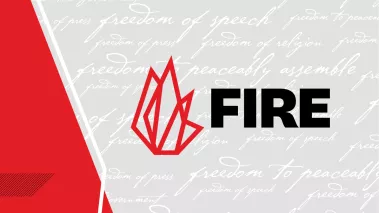Table of Contents
A Not-So-Happy Easter at Penn Law

Last Friday, March 25 (which was Good Friday for most Christians), a tempest erupted at the University of Pennsylvania Law School here in Philadelphia. It seems that the Christian Legal Society (CLS) at Penn Law has a tradition of hiding plastic Easter eggs around the school on Good Friday for students to pick up. These eggs contain candy and a printed Bible verse, and the Bible verse can be taken to a CLS table and redeemed for more candy. Apparently this event has taken place without incident for a number of years.
Not this year. This year, CLS members arriving at the law school to hide their eggs on the morning of Good Friday discovered that someone else had beat them to it. Upon opening the eggs, they found not candy but cartoons of Jesus saying things that many Christians would find offensive. For instance, one features Jesus referring to God as “just a stupid old asshole,” while another depicts Jesus as questioning his sexuality. This may not exactly constitute engaging in a constructive dialogue, but that’s not required—it’s well within the bounds of free speech.
So I’m sure you can guess the rest of the story: the offended group of students went to the administration, demanding that the culprit be found and disciplined for the “hate crime” of pushing beliefs that the group finds offensive. FIRE has seen this kind of thing time and time again—and we’re always on the side of defending the rights of the “culprit.”
But this time, something very different happened: Penn Law’s CLS didn’t ask for censorship at all! Instead, it publicly defended the right of its opponent (who turned out to be fellow Penn Law student George Black) to speak and invited FIRE’s David French to come to the law school on Wednesday and give a talk abut the issues raised by the incident. An article in today’s Daily Pennsylvanian tells the story:
Yesterday, the CLS hosted a discussion about campus free speech led by David French, president of the Philadelphia-based Foundation for Individual Rights in Education, in response to the egg incident. [CLS President Heather] Gebelin said she hoped to foster an open dialogue about Christianity at the Law School. FIRE is an organization that was co-founded by professor Alan Kors in response to a free-speech incident on Penn’s campus in 1993.
“If [Black is] interested in having a free exchange, let it be,” Gebelin said. “We don’t like what he did, [but] we wouldn’t want him to be censored.”
Black, however, said the CLS’s reaction has been too harsh.
“I thought it was funny,” Black said. “I thought it’d be considered offensive, but I didn’t think that people would have a stick up their ass about it.”
The actions of Penn Law’s CLS chapter should be commended by every friend of liberty on college campuses. Faced with an assault on their religious beliefs, the leader of CLS rejected the all-too-common option of demanding official censorship and instead publicly announced that the group’s opponents had a right to speak. Far from being “too harsh,” CLS’s reaction is a model for what other student groups faced with similar situations should do.
The only potentially troublesome note in this situation comes from this passage in the Daily Pennsylvanian article:
Gary Clinton—the Law School’s associate dean for student affairs—declined to comment on any disciplinary action Black will face, if any, citing confidentiality rules.
Penn must realize that there is and should be no basis for disciplining Black for his expression. While his actions may have been obnoxious, this is no justification for Penn to discipline this law student for expressing his views. FIRE will monitor the situation at Penn Law closely to ensure that the law school respects the free speech rights of everyone involved.
Recent Articles
Get the latest free speech news and analysis from FIRE.

FIRE's 2025 impact in court, on campus, and in our culture

The trouble with banning Fizz

VICTORY: Court vindicates professor investigated for parodying university’s ‘land acknowledgment’ on syllabus
